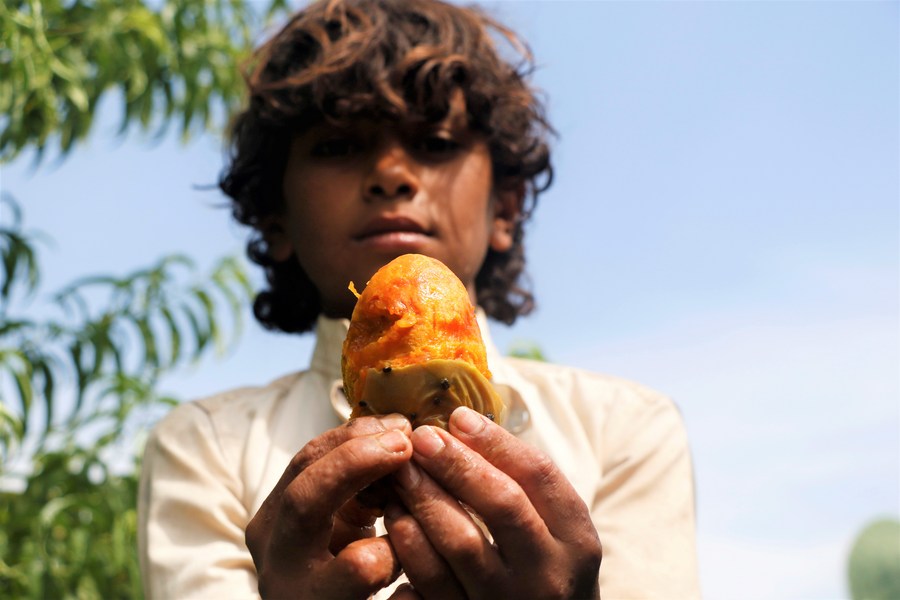
A child shows a prickly pear fruit at a farm on the outskirts of Sanaa, Yemen, July 21, 2020. (Photo by Mohammed Mohammed/Xinhua)
In the harvest time of prickly pear fruit in war-torn Yemen, farmers, villagers and vendors collect and sell the fruits to make a living for their families.
SANAA, Aug. 3 (Xinhua) -- It's harvest time of the prickly pear fruit in war-torn Yemen and the markets in Sanaa are packed with people despite the spread of COVID-19 pandemic.
With the early morning sun, hundreds of farmers, villagers and street vendors go to the arid hills of the southeastern outskirts of the capital Sanaa to collect the prickly pear fruit.
It is delicious, healthy, cheap and among the best-selling fruits in the local market.

A vendor prepares prickly pear fruits on his wheelbarrow for sale at a street in Sanaa, Yemen, on July 21, 2020. (Photo by Mohammed Mohammed/Xinhua)
Many Yemeni farmers have turned to cultivate this kind of thorny desert plant in their farms after the civil war broke out five years ago.
The long war in Yemen and economic blockade have led to continuing fuel shortages that caused the stop of irrigation pumps and turned thousands of fertile hectares into barren lands.
"The cultivation of this fruit is profitable and bring in good income because it grows quickly and needs no much irrigation," Ahmed Mutahar told Xinhua in front of his farm in Ghaiman area in Khawlan district, about 30 km to the southeast of the capital Sanaa.
"Many youth resort to this seasonal fruit to sell it on carts in the streets for making a living for their families," Mutahar added.

A farmer collects prickly pear fruits at his farm on the outskirts of Sanaa, Yemen, July 21, 2020.(Photo by Mohammed Mohammed/Xinhua)
Yemen has been mired in civil war since late 2014, when the Iran-backed Houthi group seized control of much of the country's north and forced the Saudi-backed government of President Abd-Rabbu Mansour Hadi to flee the capital Sanaa.
The Saudi-led military coalition intervened in the Yemeni conflict in early 2015 to support Hadi's government.
The war has killed tens of thousands of people, mostly civilians, displaced over 3 million, and caused the collapse of the country's economy and destroyed the infrastructure and the agricultural sector.
"Yemen is the largest hunger crisis in the world. Millions of people are living on the edge of famine and the situation is getting worse by the day," said the World Food Programme (WFP) in a recent statement.
"Over 20 million Yemenis are food insecure, of which nearly 10 million are acutely food insecure," the WFP added.

A farmer displays a prickly pear fruit after he peels it at a farm on the outskirts of Sanaa, Yemen, July 21, 2020. (Photo by Mohammed Mohammed/Xinhua)
Millions of families are struggling to get one meal a day, amid a rapid depreciation of the country's currency, stopping the payment of salaries, and the tightening economic embargo.
The situation is getting worse by the day, forcing millions of Yemenis to search for any daily job opportunity.
In the capital Sanaa, many young men and elders are pushing wheelbarrows full of prickly pear fruits in the corners of the crowded streets and markets.
"In this season of prickly pear fruits, we are earning a living ... people come and buy," street vendor Ali Salman told Xinhua.
Talal Abdulrahman, one of the Sanaa city's residents, came to buy. "It is delicious, healthy and cheap," he told Xinhua. ■



